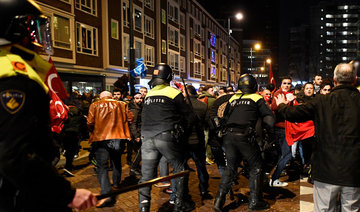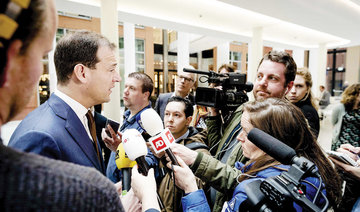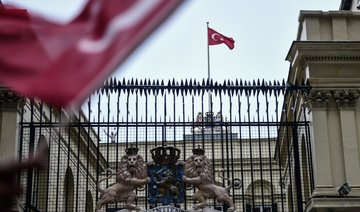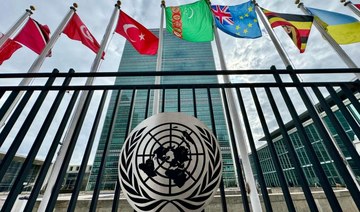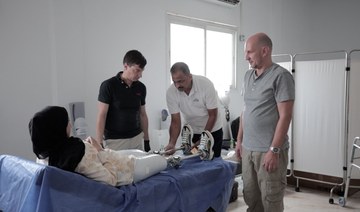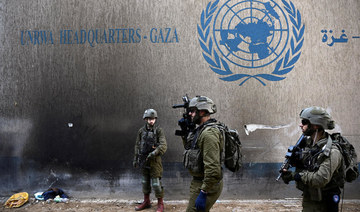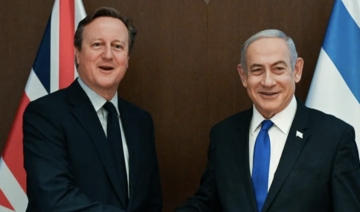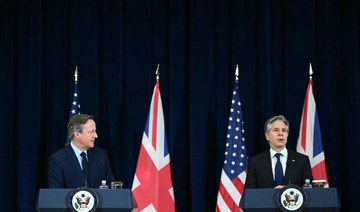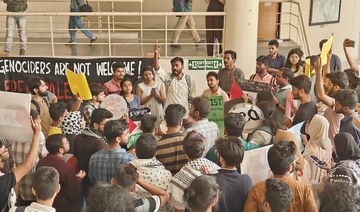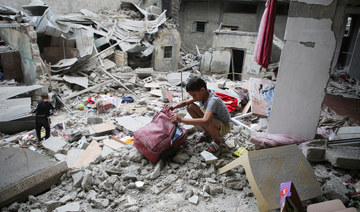ANKARA, Turkey: Ankara banned the Dutch ambassador from returning to Turkey as part of a series of political sanctions against the Netherlands on Monday over its refusal to allow two Turkish ministers to campaign there.
It also halted high-level political discussions between the two countries and closed Turkish air space to Dutch diplomats.
Deputy Prime Minister Numan Kurtulmus, briefing journalists after the weekly council of ministers meeting, said the sanctions would apply until the Netherlands takes steps “to redress” the actions that Ankara sees as a grave insult.
“There is a crisis and a very deep one. We didn’t create this crisis or bring it to this stage,” Kurtulmus said. “Those who did have to take steps to redress the situation.”
Other sanctions bar the Dutch ambassador entry back into Turkey and advise parliament to withdraw from a Dutch-Turkish friendship group
The announcement came hours after Turkey’s foreign ministry formally protested the treatment of a Turkish minister who was prevented from entering a consulate in the Netherlands and escorted out of the country after trying to attend a political rally.
The ministry also objected to what it called a “disproportionate” use of force against demonstrators at a protest afterward. Separately, Turkey’s foreign minister was denied permission to land to address the same rally in Rotterdam.
The argument is over the Netherlands’ refusal to allow Turkish officials to campaign there to drum up support among Turks who are eligible to vote in an April 16 referendum that would greatly expand the powers of Turkish President Recep Tayyip Erdogan.
About 400,000 people with ties to Turkey live in the Netherlands, though it’s not clear how many are eligible to vote.
Erdogan said the two cabinet ministers — Foreign Minister Mevlut Cavusoglu and Family Affairs Minister Fatma Betul Sayan Kaya, would ask the European human rights court to weigh in on their treatment. He added that he didn’t think the court would rule in Turkey’s favor.
Earlier, German Chancellor Angela Merkel backed the Netherlands in its diplomatic fight with Turkey, as NATO’s chief called for alliance members to respect each other and the European Union urged Turkey to calm down.
Turkey had a similar dispute with Germany last week, but the fight with the Netherlands comes as that country prepares for its own election Wednesday pitting Prime Minister Mark Rutte’s right-wing PVV Party against far-right, anti-Islam populist Geert Wilders’ party.
Merkel, speaking at a news conference in Munich on Monday, pledged her “full support and solidarity” to the Dutch, saying the Nazi gibes were “completely unacceptable.”
Erdogan responded angrily to Merkel’s support for the Netherlands. “Shame on you!” he exclaimed during an interview with A Haber television on Monday.
He renewed accusations that Germany supported “terrorists” battling Turkey and that it backed the ‘no’ campaign in the Turkish referendum, arguing that Berlin did not want to see a strong Turkey emerge.
“Some of the European Union countries — let’s not put all of them in the same sack — unfortunately cannot stomach Turkey’s rise,” Erdogan said. “Sadly, Germany tops the list. Germany supports terror in a cruel way.”
He went on to advise Turks living in Europe not to vote for parties that he described as “enemies of Turkey.”
NATO Secretary General Jens Stoltenberg urged all members of the alliance “to show mutual respect, to be calm and have a measured approach.”
The European Union also called on Turkey to “refrain from excessive statements and actions that risk further exacerbating the situation.” EU spokesman Margaritis Schinas added that it was essential to avoid further escalation and find ways to calm the situation.
In the television interview, Erdogan repeated slurs against the Netherlands, saying: “their Vienna Convention is their fascism. Their Nazism. We can say neo-Nazism.” He was referring to a 1961 international treaty on diplomatic relations.
Turkey is a candidate to join the European Union, although the membership negotiations have made little progress over the past decade. The country has become a vital partner in a deal with the EU to curb the passage of migrants and refugees from Turkey into Europe.
Omer Celik, Turkey’s minister in charge of European Union affairs, said Monday that his country should consider reviewing the migration deal to relax controls on people reaching Europe by walking into Greece or Bulgaria.
“In my opinion the issue of the land passages should be reviewed,” the state-run Anadolu Agency quoted him as saying.
The Dutch, meanwhile, issued a travel advisory to their citizens to “be alert and avoid gatherings and busy places throughout Turkey.”
Earlier in the day, Turkey summoned the Dutch Embassy’s charge d’affaires, Daan Feddo Huisinga, to the Foreign Ministry, where a senior official handed him two formal protest notes. It’s the third time the Dutch diplomat has been summoned since tensions broke out between the two countries.
The first note protested how the family minister was treated. The second note protested the treatment of Turkish citizens who gathered outside the Turkish Consulate in Rotterdam from Saturday night into Sunday morning, saying “disproportionate force” was used against “people using their right to peaceful gatherings.”
The deputy prime minister said the political sanctions would remain in place until the Dutch government meets conditions that were set out in the diplomatic protest notes, including apologizing and punishing authorities who mistreated Turks
“Until the Netherlands takes steps to compensate for what it did, high-level relations, planned meetings, meetings between ministers or higher level meetings, high-level official talks will be suspended or delayed,” Kurtulmus said. (With input from AP)
Turkey sanctions the Netherlands over ministers’ treatment
Turkey sanctions the Netherlands over ministers’ treatment
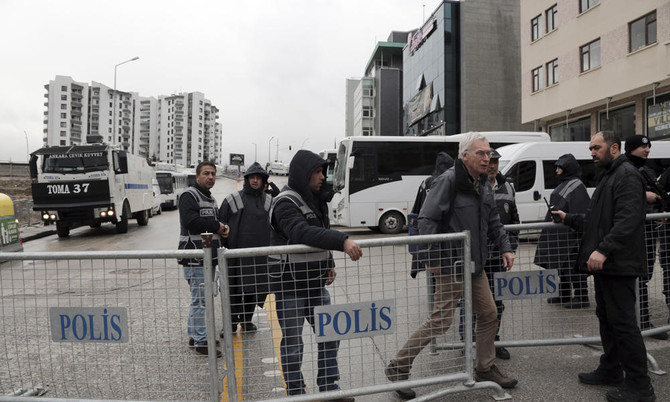
Dubai launches major AI economic strategy
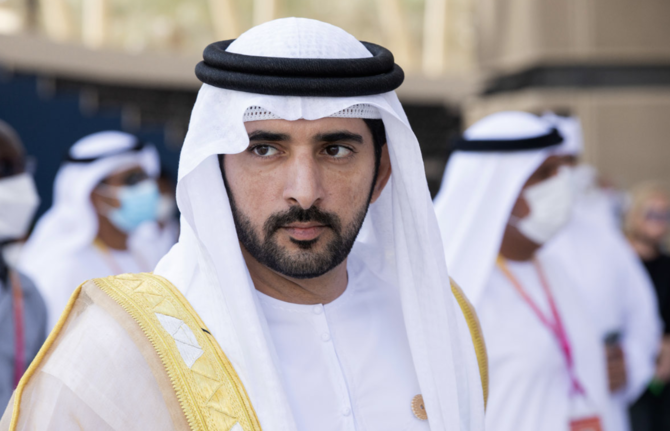
RIYADH: Dubai’s crown prince on Monday launched a major artificial intelligence drive across government, business and education in the emirate.
The Dubai Universal Blueprint for Artificial Intelligence aims to achieve the Dubai Economic Agenda D33 — to double the size of the economy by 2033 — by adding AED100 billion ($27 billion) from digital transformation and increasing economic productivity by 50 percent.
The strategy includes appointing chief Al officers in government entities, the launch of a Dubai AI and Web3 campus, the launch of AI weeks at the emirate’s schools, a plan to attract data centers and the launch of a trade license for AI.
Sheikh Hamdan bin Mohammed Al-Maktoum said that the initial phase of the plan, by leveraging AI, would enhance quality of life and well-being for Dubai residents.
“Dedicated incubators and campuses for artificial intelligence will be launched to further enhance Dubai’s vibrant AI ecosystem, and finally AI will be celebrated in Dubai schools with the introduction of an AI week,” he said on X.
“We will annually review, update and introduce new projects under this plan, ensuring it keeps pace with all developments. Dubai is a city centered around its people, and to this end, we will dedicate all our resources and energy to make it the happiest place in the world.”
The crown prince said: “In 1999, his highness Sheikh Mohammed bin Rashid Al-Maktoum initiated the pioneering journey of the future by launching Dubai’s digital transformation, a venture that has continued to achieve milestones, leading to the recent unveiling of the Dubai Digital Strategy last year.
“We have realized record-breaking accomplishments that have established us as the premier hub for billion-dollar global enterprises in the technology and artificial intelligence sectors within the region,” he added.
Sheikh Hamdan said that the evolution of AI is presenting opportunities for nations and governments, but posing challenges to those unable to keep pace.
For Dubai, this requires a “swift and adaptive action plan,” responding to the “rapid changes in technology and AI,” he added.
UAE clothing brand ‘The Giving Movement’ donates over $800,000 to Gaza
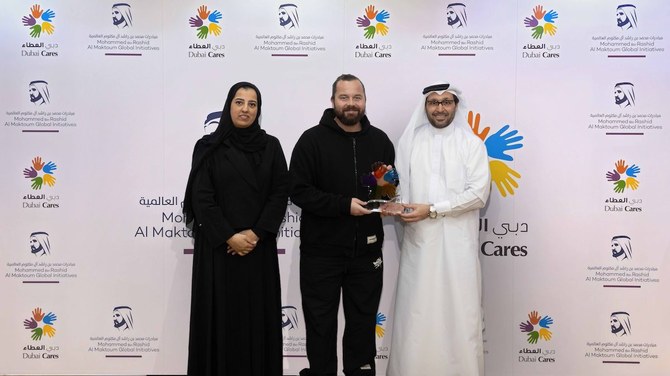
- Donations earmarked for hot meals, food packages, and the provision of emergency shelter
DUBAI: A UAE-based sustainable clothing brand said on Monday that it had contributed more than AED 3 million ($816,798) in emergency relief aid for Gaza since the beginning of Israel’s war on the Palestinian enclave.
All proceeds donated to Dubai Cares charity by The Giving Movement were earmarked for the delivery of crucial support to Palestinians in Gaza, including hot meals, food packages, and the provision of emergency shelter.
The brand raised the money through the “Gaza In Our Hearts” fundraising campaign.
Dubai Cares has forged a partnership with American Near East Refugee Aid, a nongovernmental organisation, collaborating closely with UN agencies, diplomatic channels, and other NGOs to establish aid channels for swift and effective delivery of life-saving supplies.
Dr. Tariq Al-Gurg, CEO of Dubai Cares, commended the clothing brand for its philanthropic efforts.
“The Giving Movement has truly embodied its brand name and set an example for other brands to make a positive impact on the lives of those who urgently need our assistance,” he said.
Dominic Nowell-Barnes, founder of The Giving Movement, said: “Our collaboration with Dubai Cares underscores our commitment to standing with the community and providing assistance to those in need.
Hamas must accept truce deal and be removed from Gaza leadership, UK foreign secretary says
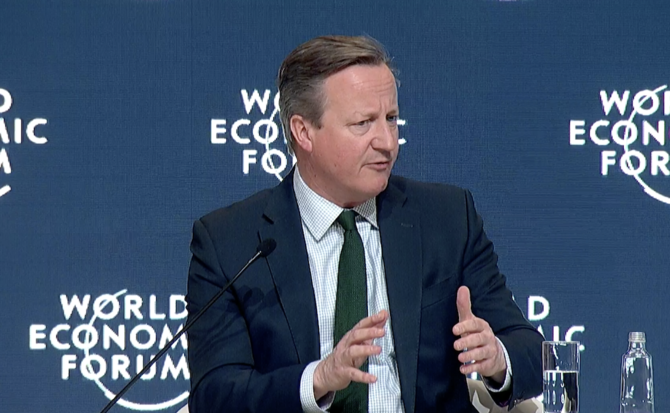
- ‘All the pressure of the world’ should be on militant group, David Cameron tells WEF Special Meeting in Riyadh
RIYADH: Hamas was urged on Monday by British Foreign Secretary David Cameron to accept an offer of a 40-day ceasefire and the release of “potentially thousands” of Palestinian prisoners in return for freeing Israeli hostages.
Speaking at a Special Meeting of the World Economic Forum in Riyadh, the former UK prime minister said the Palestinian militant group had been given “a very generous offer of sustained 40-day ceasefire, the release of potentially thousands of Palestinian prisoners, in return for the release of these hostages.”
A Hamas delegation is due in Egypt on Monday, where it is expected to respond to the latest proposal for a truce in Gaza and a release of hostages after almost seven months of war in the enclave, which broke out after militants killed nearly 1,200 people in southern Israel on Oct. 7.
“I hope Hamas do take this deal and, frankly, all the pressure in the world and all the eyes of the world should be on them today saying take that deal,” Cameron said, adding the proposal would lead to a “stop in the fighting that we all want to see so badly.”
Egypt, Qatar and the US have been trying to mediate an agreement between Israel and Hamas for months, but a flurry of diplomacy in recent days appeared to suggest a new push toward halting hostilities.
The UK foreign minister said that for Palestinian statehood to become a reality, there needed to be a wholesale change in thinking on both the Israeli and Palestinian side.
For a “political horizon for a two-state solution,” with an independent Palestine co-existing with Israel, the “people responsible for Oct. 7, the Hamas leadership, would have to leave Gaza and you’ve got to dismantle the terrorist infrastructure in Gaza,” he said.
“You’ve got to see a political future for the Palestinian people, but you’ve also crucially got to see security for Israel, and those two things have to go together,” he added.
Pakistani Prime Minister Shehbaz Sharif, who joined Cameron on the panel discussing what policymakers needed to do to rejuvenate global growth, went further and told the forum that the world could not focus on economic development unless it had peace.
“I want to make it very clear, the world will not be in peace unless there is a permanent peace in Gaza; I am speaking very frankly,” he said.
Sharif said the breakout of conflict between Russia and Ukraine had already given a warning of what conflict means for growth, adding that it caused commodity prices to skyrocket, inflation to soar, and impacted imports and exports of food and raw materials.
Saudi Arabia’s Minister of Economy and Planning, Faisal Alibrahim, echoed the Pakistani leader’s assertions, adding that current economic growth levels were lower than desired, and that increased productivity and global collaboration were the two keys to improving the situation.
“Productivity needs to see an upward shift,” he said. “We need to focus on the tools, the interventions, that will help us grow productivity.
“Secondly, (do we want) collaboration or fragmentation? A more fragmented world is a lower-growth world and with fragmentation comes a lot of cost. Without collaboration, we cannot achieve higher growth rates for the global economy.”
US, Britain urge Hamas to accept Israeli truce proposal
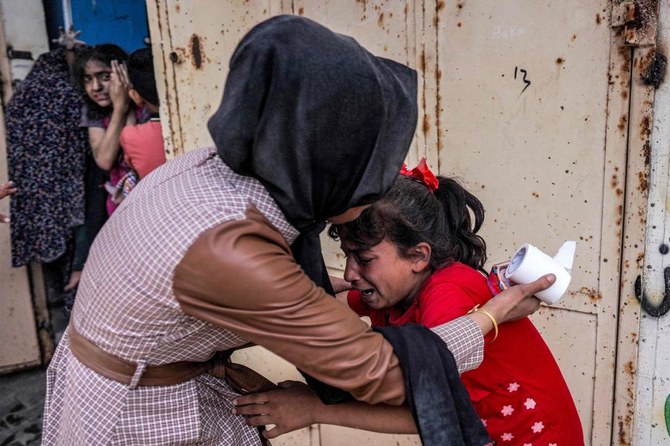
- “Hamas has before it a proposal that is extraordinarily, extraordinarily generous on the part of Israel,” Blinken said
- Britain’s Foreign Secretary David Cameron also described the Israeli proposal as “generous”
RIYADH: US Secretary of State Antony Blinken on Monday urged Hamas to swiftly accept an Israeli proposal for a truce in the Gaza war and the release of Israeli hostages held by the Palestinian group.
Hamas negotiators were expected to meet Qatari and Egyptian mediators in Cairo on Monday to deliver a response to the phased truce proposal which Israel presented at the weekend.
“Hamas has before it a proposal that is extraordinarily, extraordinarily generous on the part of Israel,” Blinken said at a meeting of the World Economic Forum in the Saudi capital Riyadh.
“The only thing standing between the people of Gaza and a ceasefire is Hamas. They have to decide and they have to decide quickly,” he said. “I’m hopeful that they will make the right decision.”
A source briefed on the talks said Israel’s proposal entailed a deal for the release of fewer than 40 of the roughly 130 hostages believed to be still held in Gaza in exchange for freeing Palestinians jailed in Israel.
A second phase of a truce would consist of a “period of sustained calm” — Israel’s compromise response to a Hamas demand for a permanent ceasefire.
A total of 253 hostages were seized in a Hamas attack on southern Israel on Oct. 7 in which about 1,200 Israelis were also killed, according to Israeli counts.
Israel retaliated by imposing a total siege on Gaza and mounting an air and ground assault that has killed about 34,500 Palestinians, according to Gaza health authorities.
Palestinians are suffering from severe shortages of food, fuel and medicine in a humanitarian crisis brought on by the offensive that has demolished much of the territory.
Britain’s Foreign Secretary David Cameron, who was also in Riyadh for the WEF meeting, also described the Israeli proposal as “generous.”
It included a 40-day pause in fighting and the release of potentially thousands of Palestinian prisoners as well as Israeli hostages, he told a WEF audience.
“I hope Hamas do take this deal and frankly, all the pressure in the world and all the eyes in the world should be on them today saying ‘take that deal’,” Cameron said.
Cameron is among several foreign ministers in Riyadh, including from the US, France, Jordan and Egypt, as part of a diplomatic push to bring an end to the Gaza war.
Only two states for Israel and Palestine can prevent all-out regional conflict: Egypt PM
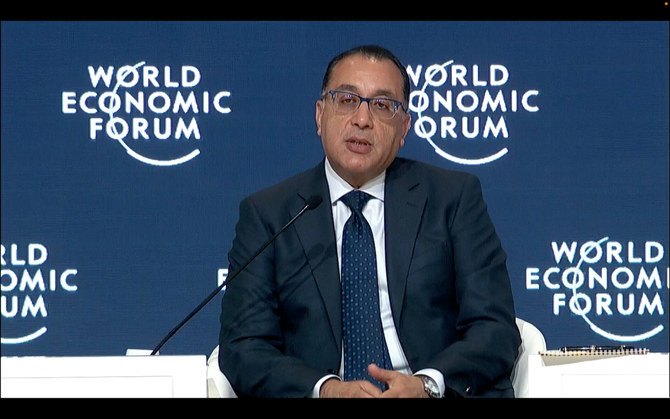
- Israel risking its future, says Egypt official at World Economic Forum
- Jordan’s PM also accuses Tel Aviv of not wanting ‘a political solution’
RIYADH: Only a two-state solution for Israel and Palestine can prevent the outbreak of an all-out regional and possible global conflict, said Egypt’s Prime Minister Mostafa Madbouli at the World Economic Forum here on Monday.
Participating in a panel discussion on Gaza, Madbouli said that if the current situation continues this would also affect the future of Israel.
“It is now or never, the whole world should unite to recognize the rights of Palestinians to have their own state. If you could imagine that postponing this will solve the problem, or will be in Israel’s interest, you are wrong. It will be against the future of Israel itself.”
He added: “We are speaking about a nation that has been under aggression and occupation for the past 75 years. Behind closed doors, everybody recognizes their right to exist, but when it comes to reality, and to have a solid solution, everybody is refraining.”
Madbouli said a two-state solution is the only remedy to achieve regional peace.
“It is today that we all have to push for a two-state solution, along with a serious regional solution. No one can imagine the situation if a regional war had to start. If you imagine that you are far then you are in a very elusive situation, everybody will be affected. We have already seen a sample of a war between Iran and Israel this month.”
Other panelists, including Jordan’s Prime Minister Bisher Al-Khasawneh and Sigrid Kaag, the UN humanitarian and reconstruction coordinator for Gaza, expressed their frustration with the situation on the ground.
Al-Khasawneh said: “This is indeed an extremely timely event, challenging and depressing. There are a lot of diplomatic activities underway, along with the continued Israeli aggression on Gaza and the potential for another catastrophic additional aggression on Rafah, which by all standards will be a catastrophe that adds on to a catastrophe that has led to conditions close to famine in Gaza.”
He said the damage caused by Israel’s campaign is estimated to be about $18.7 billion; and that the UN reports that 1.1 million children require psychological counseling.
Al-Khasawneh also called for a two-state solution: “Israel insists on making the same mistakes, and expecting different results, which is not engaging seriously in a political solution.”
He added: “The world seems to be falling into the trap of following the agenda of narrow-minded Israeli politicians, frankly speaking, and it is quite catastrophic. Today it is about the political calculations of some politicians in Israel at the expense of, the safety of Israelis, the safety of Jordanians, Egyptians, and all the Arabs. Today it’s the safety of the whole region and beyond.”
Kaag said a political solution has to be found. “If we look ahead, the reconstruction efforts, from an investment perspective, are all tied to the political parameters, the two-state solution.”
Kaag added: “The paradigm shift is in the now, but it’s also looking towards the future because of the level of destruction and despair, people there tell you that they feel like zombies. The mental health crisis is humongous. So, we need to create hope through investment, rehabilitation, and focus on the political effort. I think we failed the Palestinians countless times, and they deserve more human rights.”


